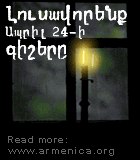The Armenian Affairs
My Sweet Hayrenik .... Your Future Is So Bright It Burns My Eyes.
- Sorry For The Inconvenience
- Gul suggests that the Europeans should reduce their standards to that of Turkey
- Invitation to an Armenian Cultural Project From Stepanavan Youth Center
- Early Day Motion In the UK Parliament To Recognize The Armenian Genocide
- Christian Union Wants to Make the Denial of Genocide Punishable
- Turkey Fails to Defeat French Bill Despite Threats and Blackmail
- You're talking nonsense, Mr Ambassador
- French National Parliament: Official Report of The Meeting of May 18, 2006
- Press Release: FRENCH GOVERNMENTS BLOCKS PARLIAMENTARY MAJORITY FROM VOTING TO OUTLAW GENOCIDE DENIAL
- Armenian Genocide and Denial: The Discussion, The Deferred Vote
- February 5, 2006
- February 12, 2006
- February 19, 2006
- February 26, 2006
- March 5, 2006
- March 12, 2006
- March 19, 2006
- April 2, 2006
- April 9, 2006
- April 16, 2006
- April 23, 2006
- April 30, 2006
- May 7, 2006
- May 14, 2006
- May 21, 2006
- May 28, 2006
- June 11, 2006
- June 25, 2006
- July 9, 2006
- October 29, 2006
 - Armenian Genocide [Wikipedia Article]
- Armenian Genocide [Wikipedia Article]- Armenian Genocide [Armeniapedia Article]
- Armenian Genocide: Fact Sheet [The University of Michigan]
- Frequently Asked Questions [The Armenian Research Center]
- Frequently Asked Questions [Armenian National Institute]
- Armenian Genocide [Hye Etch]
- Case Study:Armenian Genocide[Genocide Watch] - Armenian Genocide [United Human Rights]
- Armenian Genocide [Human Rights Action]

- Armenian Letter 1
- Armenian Letter 2
- Armenian Letter 3
- Armenian Letter 4 Part I
- Armenian Letter 4 Part II
- Armenian Letter 5
- Armenian Letter 6

- Armenians @ Google News
- A1 Plus
- Aravot Daily
- ARKA
- Armenian Directory
- Armenian Food
- Armenian Freedom Network
- Armenian Liberty
- Armenian Life - Armenia Now
- Arm Info
- Arm Radio
- ArmTown
- Asbarez
- Azad Hye
- Azat Artsakh [AM]
- AZG Armenian Daily
- Aztag Daily[AM]
- Aztag English
- Groong News
- Hairenik - Armenian Weekly
- HETQ Online
- Hye Tert [TR]
- Nor Marmara Daily [AM]
- Noyan Tapan
- Oratert [AM]
- Orenats Yerkir [AM]
- PanARMENIAN News
- Panorama
- Parev.net
- Yerkir
- Zartonk Daily

- "Blogian"
- Abovian
- Armenia 1927 ~ Rwanda 2006
- Armenian Issues
- Armenian Eagle
- Armenian Deck of 52
- Armenian Medical Network
- Armenian Music Review
- ArMeniAn rOOm
- Armen Yousoufian's Blog
- Arm Youth Blog "In Armenian"
- Arm Youth
- Artyom Reader
- Azad Hye
- Basturma Chronicles
- Belgravia Dispatch
- Blogrel
- Democracy Guy
- Esoteric Alchemy
- Four Shans 4 Armenia
- Hakob Gevorgian
- Hyelog
- Inch es asum?!
- Iron Ladle
- it's under my bed
- Life as I see it
- Life around me
- Life in Armenia
- Life in the Armenian Diaspora
- Martuni or Bust!!!
- My Big Fat Armenian Blog
- Notes From Hairenik
- One World Multimedia Blog
- RESEAUNATE.90
- Tamara's Blog
- The Arabian Productions
- The Penetrating Armenian
- Two sides of the Armenian diaspora
- V for Vegetarian
- Vatche Arabian
- Voch Me Ban
- Who knew Armenians Could Rap?




Current Posts

Visitors Since Feb.2006
Hits Since Feb. 2006










What's So Special About The Armenians ??
We are few but we are called Armenians
We do not put ourselves above anyone
Simply we also admit that we, only we have Mount Ararat
And that it is right here on the clear Sevan
that the sky could make its exact duplicate
Simply David has indeed fought right here
Simply the Narek was written right here
Simply we know how to build from the rock, a monastery
How to make fish from stone, how to make man from clay
To learn to become the student of the beautiful,
the kind, the noble, and the good.
[Baruyr Sevak]
![Order Your Copy of Andrew Goldberg's Documentary [The Armenian Genocide]](http://www.twocatstv.com/images/feature_box_armgeno180.jpg)












![Visit Genocide.RU [RU]](http://img107.imageshack.us/img107/1508/img012go.gif)
![Visit Genocido Armenio.org [SP]](http://img96.imageshack.us/img96/2991/spanish9lk.jpg)
![Visit Imprescriptible [FR]](http://img164.imageshack.us/img164/5097/french9fz.jpg)
















